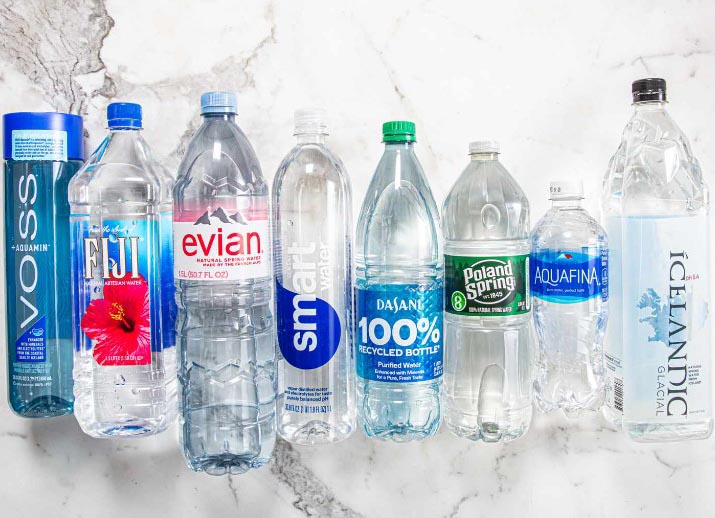New study finds that bottled water consumption linked to increased risk of chronic diseases
Nikhil Prasad Fact checked by:Thailand Medical News Team Aug 15, 2024 1 year, 4 months, 3 weeks, 29 minutes ago
Medical News: The Hidden Threat in Your Water Bottle
Bottled water has become a staple in many households, often seen as a convenient and clean source of hydration. However, a recent study by researchers from the Polytechnic University of the Marche Region in Italy has revealed a potential hidden danger lurking in those plastic bottles. This
Medical News report explores the findings of a nationwide study that investigated the association between bottled water consumption and the risk of developing chronic diseases such as hypertension, diabetes, kidney stones, and gastric or duodenal ulcers.
 New study finds that bottled water consumption linked to increased risk of chronic diseases
Understanding Microplastics: What Are They?
New study finds that bottled water consumption linked to increased risk of chronic diseases
Understanding Microplastics: What Are They?
Plastics, when broken down over time, can form smaller particles known as microplastics (less than 5 mm) and even smaller ones called nanoplastics (less than 1 µm). These tiny particles have been found in various everyday products, including bottled water. Alarming data suggests that on average, a liter of bottled water contains approximately 240,000 microplastic particles. These particles are small enough to infiltrate human cells and tissues, raising serious concerns about their potential impact on health.
Microplastics can accumulate in different organs and systems within the body, potentially causing harm through various biological pathways. The study by the Italian researchers sought to explore these impacts in detail, particularly in relation to chronic diseases that affect millions of people worldwide.
The Study: Scope and Methodology
The researchers analyzed data from the Italian National Institute of Statistics’ "Aspects of Daily Life" survey, which included a representative sample of 45,597 individuals across Italy. The study focused on adults aged 18 and older, examining the correlation between bottled water consumption and the prevalence of chronic diseases such as hypertension, diabetes, kidney stones, and gastric or duodenal ulcers.
The data collection process was rigorous, involving a combination of survey techniques to ensure a comprehensive and reliable dataset. The researchers used logistic regression models to account for various factors such as age, gender, education level, economic resources, body mass index (BMI), smoking status, alcohol consumption, and physical activity.
Key Findings: Bottled Water and Health Risks
The study's results revealed a statistically significant association between bottled water consumption and an increased risk of several chronic diseases:
-Hypertension: The study found that individuals who regularly consumed bottled water had a 5% higher risk of developing hypertension compared to those who did not. The odds ratio (OR) was 1.05, with a confidence interval (CI) of 1.00 to 1.11.
-Diabetes: Bottled water consumption was associated with
a 9% higher risk of developing diabetes, with an OR of 1.09 (CI: 1.01–1.18).
-Kidney Stones: The risk of kidney stones was 17% higher among bottled water drinkers, with an OR of 1.17 (CI: 1.03–1.32).
-Gastric/Duodenal Ulcers: The most significant finding was the 21% increased risk of gastric or duodenal ulcers among those who consumed bottled water regularly, with an OR of 1.21 (CI: 1.07–1.38).
These findings are particularly concerning given the widespread consumption of bottled water. The study highlights that more than 56% of the participants regularly drank bottled water, underscoring the potential public health implications of these findings.
How Microplastics Affect the Body
The health risks associated with microplastics are believed to be multifaceted. These tiny particles can disrupt the body's normal functions in several ways:
-
Oxidative Stress: Microplastics can induce oxidative stress, a condition where harmful free radicals damage cells, leading to inflammation and various diseases.
-Immune Dysfunction: Exposure to microplastics can impair the immune system, making the body more susceptible to infections and chronic diseases.
-Hormonal Disruption: Chemicals present in plastics, such as bisphenol A (BPA) and phthalates, are known endocrine disruptors. They can interfere with hormone balance, leading to conditions like diabetes and other metabolic disorders.
- Damage: Studies have shown that microplastics can cause direct damage to cells, leading to inflammation, cell death, and possibly contributing to the development of chronic diseases like cancer.
The Broader Impact: Plastic Pollution and Public Health
The implications of this study extend beyond individual health risks. Plastic pollution is a global issue, with millions of tons of plastic waste accumulating in the environment each year. As plastics degrade, they release microplastics into the environment, contaminating water sources, soil, and even the air we breathe.
This study raises important questions about the long-term impact of plastic pollution on public health. While bottled water is just one source of microplastic exposure, it is a significant one, given its widespread use.
Conclusion: Rethinking Bottled Water
The findings of this study suggest that bottled water, often perceived as a healthier alternative to tap water, may carry hidden risks due to the presence of microplastics. These tiny particles have been linked to an increased risk of chronic diseases, including hypertension, diabetes, kidney stones, and gastric or duodenal ulcers.
Policymakers and public health officials must take these findings seriously and consider measures to reduce plastic pollution and promote safer alternatives to bottled water. Public awareness campaigns could encourage people to switch to tap water or other plastic-free sources of hydration. Additionally, further research is needed to fully understand the impact of microplastics on human health and to develop strategies for mitigating these risks.
The study findings were published in the peer-reviewed journal International Journal of Environmental Research and Public Health.
https://www.mdpi.com/1660-4601/21/8/1074
For the latest on microplastics, keep on logging to Thailand
Medical News.
Read Also:
https://www.thailandmedical.news/news/more-than-2-million-bottles-of-perrier-ordered-destroyed-after-fecal-bacteria-was-found-in-stocks
https://www.thailandmedical.news/news/spanish-study-finds-that-nitrates-in-drinking-water-increases-risk-for-prostate-cancer
